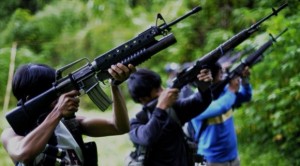LUCENA CITY – The Communist Party of the Philippines (CPP) has ordered the New People’s Army (NPA) rebels to heighten attacks against government forces and urged all guerilla units to seize more weapons this year.
“Under the direction of the CPP, the NPA will undertake more frequent tactical offensives in order to annihilate weak enemy units and seize more weapons… every NPA command must gun for a record increase in the number of weapons seized from the reactionary military, paramilitary and police forces,” the CPP said in a statement issued Tuesday (Dec 31).
On its 45th founding anniversary on Dec. 26, the CPP said they planned to increase the number of Red fighters to 25,000. The military place the current strength of the NPA rebels to around 4,000.
The CPP said it also wanted to raise the number of guerrilla fonts to 200, from 110 scattered in 71 of the 81 provinces of the country.
The party scoffed at the military’s “Oplan Bayanihan” for its failure to achieve its declared aim of reducing the armed strength of the communist rebels “to inconsequentiality” by the middle of 2013.
The NPA rebels, the CPP’s armed wing, have been waging war against the government for the past 44 years, considered as the world’s longest-running Maoist-inspired rebellion.
Lt. Col. Ramon Zagala, AFP public information chief, defended the military’s counterinsurgency campaign called the Internal Peace and Security Plan Bayanihan.
Zagala claimed “Oplan Bayanihan” has freed 29 provinces from communist influence.
The AFP spokesman said that instead of waging violence to make themselves relevant, the CPP-NPA should just surrender and commit themselves to the peace process without preconditions.
In Southern Luzon, more NPA rebels were surrendering to government security forces due to “hardships” and “failed promises” of the revolutionary movement, according to the military.
Before Christmas, five alleged NPA Army rebels operating in Quezon surrendered to the government forces.
Lt. General Caesar Ronnie Ordoyo, the head of the Armed Forces Southern Luzon Command (Solcom), said 25 rebels have already surrendered in Southern Tagalog region and 26 in Bicol.
The CPP predicted more powerful mass protests against the Aquino regime in 2014 due to perceived “widespread corruption, worsening economic conditions, unabated destruction of the environment, blind puppetry to the US imperialists and utter failure to address the urgent needs of the people amid natural and man-made disasters”.
“Aquino’s promises of clean government and reform have all fallen flat.
Aquino’s rhetoric of ‘hope’ is roundly repudiated and dismissed with
widespread cynicism among the working class and even the middle class of small professionals, teachers, government employees, students, media practitioners and small and middle businessmen,” the CPP said.
The party also noted that 2014 has started with another round of oil price hikes.
The big 3 oil firms – Petron, Shell and Chevron – have raised prices starting 6 a.m. of Dec. 31 by P1.15 per liter for gasoline, 75 centavos per liter for diesel and 60 centavos per liter for kerosene.
“A new hike in the taxes imposed on cigarettes and other commodities—a foreboding of greater hardships for the Filipino people in the coming year,” said the CPP.
In March 1969, the new and revitalized CPP founded by former University of the Philippines professor Jose Maria Sison established the NPA as the party armed wing.
The first rag-tag guerilla unit was armed with 9 automatic rifles and 26 inferior hand guns, according to Sison.
By carrying out tactical offensives through ambuscades and raids against remote police stations, the rebels were able to accumulate arms for its recruits mostly from among the ranks of farmers, workers and student activists.


